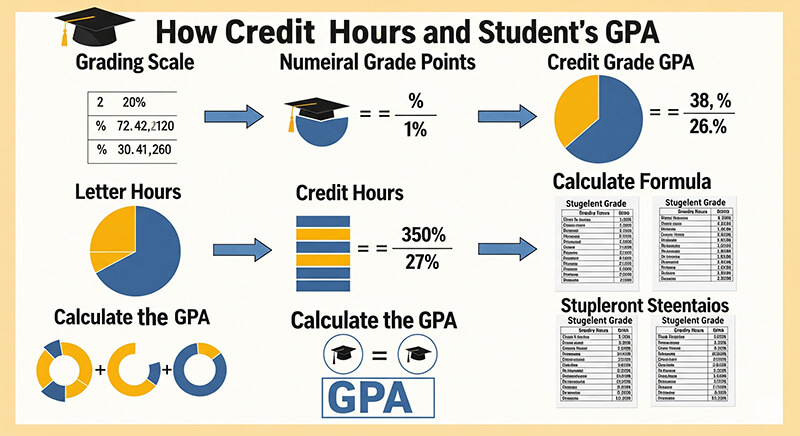See Your Future GPA: The Major-Change Impact Tool
Changing your major can change your GPA. A Major-Change GPA Impact Tool lets you see how switching your field of study will affect your grades and graduation date. This helps you make a smart choice about your academic future. It takes the guesswork out of big decisions.
| Key Takeaway | Description |
|---|---|
| Predict Your GPA | A Major-Change GPA Impact Tool shows you what your new GPA might be before you switch majors. |
| Plan Your Graduation | The tool helps you see if changing majors will mean you have to stay in school longer. |
| Avoid Surprises | You can see if your GPA is likely to drop, so you can make a plan to keep your grades up. |
| Make Smart Choices | This tool gives you the information you need to decide if changing your major is the right move for you. |
What Is a Major-Change GPA Impact Tool?
A Major-Change GPA Impact Tool is a special calculator. It helps you see what will happen to your GPA if you switch majors. The tool looks at the classes you have already taken. It figures out which ones will count for your new major. Then, it lets you add the new classes you will need to take. This gives you a good guess of your future GPA. You can learn the basics of how to calculate GPA to understand the math behind it. A great website like The GPA Calculator can make this process easy.
Why Changing Your Major Affects Your GPA
When you change your major, your GPA can go down. Studies show that students who switch majors more often sometimes have lower final GPAs. This is because some of your old classes may not count toward your new major. You have to take more new classes, which adds to your workload. A college GPA calculator can help you keep track of your grades during this transition. You can also use a cumulative GPA calculator to see your overall academic performance.
How the Tool Predicts Your Future GPA
This tool works by letting you play with "what-if" situations. You can enter the grades you think you will get in your new classes. The tool then uses a simple formula to predict your new GPA. This is similar to how a mid-term grade projection slider helps you guess your final grade in a class. A GPA formula guide can show you the exact math used in these calculations. Understanding the difference between quality points vs. GPA explained is also helpful.
Which of Your Old Credits Will Count?
When you change majors, not all of your old credits may apply. Your new major will have its own set of required classes. The tool helps you see the difference between your old and new requirements. It helps you compare your core vs. elective GPA. Some of your past electives might not count anymore. A transfer credits GPA integrator is another useful tool if you are also changing schools. A prerequisite-only GPA calculator can also help you focus on the grades that matter most for your new program.
Handling Different Grade and Credit Systems
Different schools have different ways of calculating GPA. Some use a weighted system for harder classes. This means an A in an AP class is worth more points. A guide on weighted vs. unweighted GPA can explain the difference. It is also important to understand how credit hours affect your score, which a credit-hour weighting GPA guide can clarify. Being aware of weighted GPA myths debunked ensures you have the right information.
Special Cases When Changing Majors
Changing majors can get complicated if you have special situations. For example, you might have an incomplete grade on your record. A guide on GPA planning for incomplete grades can help you figure out a plan. If you have taken pass/fail classes, it is good to know how pass/fail grades impact your GPA. If you are pursuing two degrees at once, a dual-degree GPA splitter can help you manage your grades for both majors.
Using the Tool for Different School Systems
GPA rules can vary a lot between schools. A high school GPA calculator is a great tool for students planning for college. Some colleges use a trimester system, which needs a trimester GPA calculator. Other schools might use a different scale, and a 5.0 GPA scale guide can be useful. If you are an international student, an IB to GPA conversion guide can help you translate your scores.
Plan Your Next Steps in Your New Major
After you change your major, you will want to make sure you succeed. If your GPA did drop, you can take steps to bring it back up. One option is to retake a course you did poorly in. A repeat course GPA recalculator can show you how a better grade will help. You can also set a goal to get on the honor roll. A Dean's List eligibility checker can show you what grades you need to achieve that.
Track Your Progress After the Switch
Once you are in your new major, it is important to keep an eye on your grades. A semester GPA calculator lets you check your performance each term. Over time, you can see how you are doing with a GPA trend graph generator. If you have many past semesters to include, a multi-semester GPA bulk import tool can save you a lot of time. These tools help you stay on the path to success in your new field.
Avoid Common Mistakes with Your New GPA
It is easy to make errors when calculating your GPA, especially after changing majors. A common mistake is not counting credit hours correctly. Another is mixing up which classes count for your new major. A guide on common GPA calculation errors to avoid can help you stay accurate. It is also a good idea to check your official school record. A transcript GPA audit guide shows you how to make sure everything is correct.
Frequently Asked Questions (FAQ)
Will changing my major always lower my GPA? Not always. While some studies show a slight drop is common, your GPA could go up if you move into a subject you are better at or more passionate about. A Major-Change GPA Impact Tool helps you estimate the outcome.
How do I know which of my old classes will count for my new major? You will need to check the degree requirements for your new major. Your academic advisor can help you with this. The impact tool can then use this information to give you an accurate GPA prediction.
Can I change my major more than once? Yes, but changing your major multiple times can make it take longer and cost more to graduate. It is a good idea to use a planning tool and talk with an advisor to make an informed choice.
What is the difference between my major GPA and my cumulative GPA? Your major GPA is calculated using only the grades from courses required for your major. Your cumulative GPA includes grades from all courses you have taken, including electives.
Where can I find a Major-Change GPA Impact Tool? You can find helpful tools to plan your academic future at www.thegpacalculator.com. The site offers various calculators to help you project your GPA under different scenarios.










